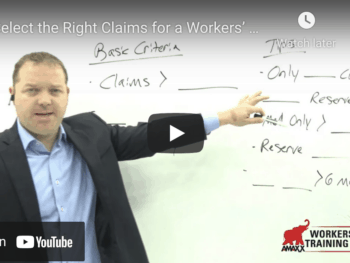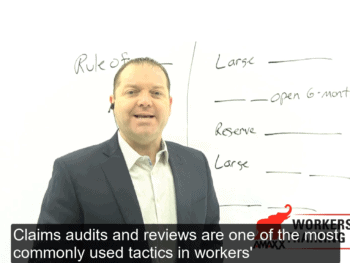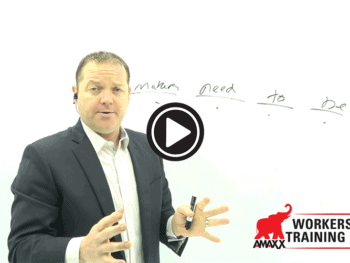
Further, internal audits can serve as verification, or factual documentation for challenges, to external audits that are conducted by insurance carriers, state bank examiners, or other auditing organizations.
Policies and Procedures for Injury Management
The policy and procedure program requires constant monitoring to ensure it complies with the workers’ compensation statute, current medical practice, implementation, and proper oversight. A claim coordinator or injury team should be designated to develop, implement and perform duties at the time of injury. The coordinator needs to be workers’ compensation claims knowledgeable.
An injury team needs to be versatile with workers’ compensation claims. It should be made up of both labor and management.
Personnel directly involved in employer reporting investigating, and documenting the injury, need training and proper instruction as to how they must perform their duties. There needs to be complete reporting to management as often as dictated by the facts of losses or program developments.
Click Link to Access Free PDF Download
“Workers’ Comp Claims Review Checklist: 9 Must-Have, Serious-Impact Elements”
Claim coordinators or injury teams need access to all necessary areas of the employer’s business to gather and disseminate their findings. They need to be compassionate yet in control of the loss. They need to be able to deal with claim adjusters, medical providers, private investigators, attorneys, and all other entities found in the claim process.
Internal investigation results, payroll data, authorities, medical needs, and other findings must be gotten to the handling claim adjuster as fast as possible. It is necessary to monitor the claim adjuster to ascertain that the coordinator or company team information is properly used. Conversely, when an adjuster requests information from the employer, the response must be as prompt as possible.
The coordinator or team must monitor claim adjusters. Following adjuster activity for control of investigation payments, controlling expenses and keeping proper reserves on the claim file until final disposition.
The entire above item needs to be audited by a senior management officer who has knowledge and ability to see flaws in the program. At the same time, when flaws occur, this person must be able to promptly make corrective change.
Utilization for Future Loss Containment and Job Modification
The claim coordinator or injury team needs to audit and review all workers’ compensation losses for frequency, severity, causation, equipment, and employee failure. These studies will guide management to institute measures for future limitations or prevention of such injuries.
Claim coordinators or injury teams can also use these causes to develop alternate, temporary, or transitional jobs within the functional capacities such studies will show. A close interface with independent medical providers will help ascertain that the projected job performance meets the functional limitations. (This might also be dovetailed with adjusters and or medical management personnel)
All claims need to be reviewed with an eye to recovery from subrogation, second injury funds, re-insurers, and restitution on fraud situations.
Auditing Error Prevention
The claim coordinator or the most knowledgeable injury team member should be the main contact person for external auditors to work. When external audits are scheduled, this person needs to be available at all times during the actual audit. Discussions during the audit as to findings or questions by the auditor need to be conducted at least once or twice a day. A wrap-up meeting is required as soon as the external adjuster completes their physical review. This can help in avoiding improper or erroneous conclusions by an auditor before a formal concluding report is presented. It is best to reach mutual agreement at the wrap-up.
Annual Claim Purging
Claim coordinators or injury teams should obtain workers’ compensation claim loss run from the insurance carrier or claim handling organization three months before renewal. Every claim listed should be reviewed for closing, proper reserves, payment errors or duplicates, expected disposition, alternate duty potential, subrogation recovery potentials, and proper recovery from re-insurers. Files that should have been closed need to be closed. Settlements or final dispositions should be pushed for closing before renewal. Excess reserves are to be lowered, and under-reserved files should be increased. A final loss run with all changes should be reviewed two weeks before the filings to ascertain that all agreed changes are complied with.
Summary
Internal audits and claim handling programs are not just for the larger employers. All employers need to explore their need for a claim coordinator or injury team to keep close control of claim costs. If you do need assistance in implanting such a program, please contact us for a recommendation.

Contact: mstack@reduceyourworkerscomp.com.
Workers’ Comp Roundup Blog: http://blog.reduceyourworkerscomp.com/
©2022 Amaxx LLC. All rights reserved under International Copyright Law.
Do not use this information without independent verification. All state laws vary. You should consult with your insurance broker, attorney, or qualified professional.












 Paradigm Named to 2022 Best Workplaces in Health Care™ List by Great Place to Work® and Fortune
Paradigm Named to 2022 Best Workplaces in Health Care™ List by Great Place to Work® and Fortune